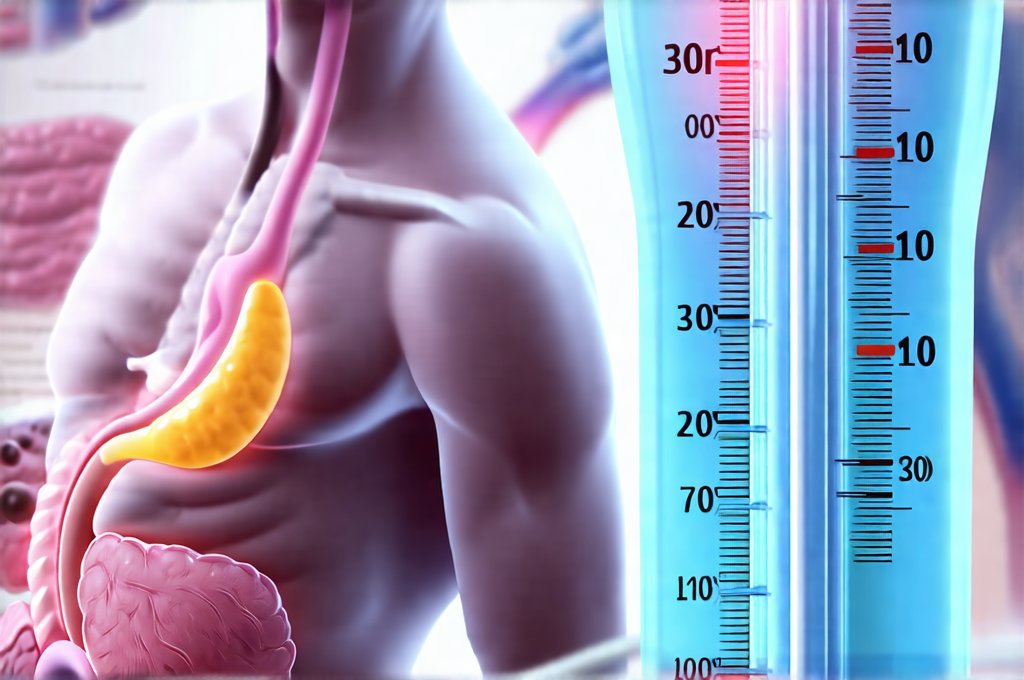Gastroesophageal reflux disease (GERD), commonly known as acid reflux, affects millions worldwide, causing discomfort ranging from mild heartburn to debilitating pain. While many factors are recognized triggers – dietary choices, stress levels, obesity, and certain medications – the subtle influence of body temperature often goes unnoticed. This article delves into the complex relationship between your internal thermal state and the frequency or severity of reflux episodes, exploring how fluctuations can impact the digestive process and esophageal function. Understanding this connection could empower you to better manage your symptoms and potentially reduce the occurrence of uncomfortable flare-ups.
Reflux isn’t simply about excess stomach acid; it’s a multifaceted issue involving the delicate interplay between the lower esophageal sphincter (LES), gastric emptying, and overall digestive health. Body temperature, as a core physiological parameter, impacts all these processes. From influencing muscle contractions to altering enzyme activity, even slight variations can have cascading effects on how efficiently your body digests food and regulates acid production. This isn’t to suggest that raising or lowering your temperature is a direct “cure” for reflux, but rather that recognizing the potential impact can inform lifestyle adjustments and symptom management strategies. We will explore these connections in detail, providing insight into what science currently understands about this often-overlooked aspect of GERD. If you find yourself struggling with chronic symptoms, consider how to build trust with your body again.
The Science Behind Temperature & Digestion
The human body maintains a remarkably stable internal temperature, typically around 98.6°F (37°C). This precise regulation is crucial for optimal enzymatic function – the biochemical reactions that drive digestion. Enzymes are incredibly sensitive to temperature; too cold and they slow down significantly, too hot and they can become denatured, losing their effectiveness entirely. A slight increase in body temperature, such as during exercise or a fever, accelerates metabolic rate and potentially speeds up gastric emptying. While seemingly beneficial, rapid gastric emptying can overwhelm the LES, increasing the risk of reflux. Conversely, cooler temperatures can slow digestion, leading to food remaining in the stomach for longer periods, potentially increasing acid production and pressure on the LES.
This intricate relationship isn’t limited to core body temperature. Even external temperature fluctuations can play a role. For example, exposure to extreme heat can cause vasodilation – widening of blood vessels – near the skin’s surface, diverting blood flow away from the digestive system. This reduced blood flow can impair digestive function and potentially contribute to reflux symptoms. Similarly, prolonged cold exposure might constrict blood vessels, also impacting digestion and possibly exacerbating existing issues. It’s important to note that these are generalized effects; individual responses vary greatly based on factors like overall health, hydration levels, and pre-existing conditions. You may find that climate affects your gut sensitivity, too.
The LES itself is a ring of muscle that prevents stomach acid from flowing back up into the esophagus. Muscle function, including the strength and coordination of the LES, is also affected by temperature. Warmer temperatures generally promote muscle relaxation, which can potentially weaken the LES’s ability to stay tightly closed. This isn’t always negative – muscle relaxation aids in digestion – but it highlights how temperature imbalances might contribute to reflux episodes in susceptible individuals. Understanding these subtle interactions is key to appreciating the complex interplay between body temperature and digestive health. Emotions can also play a role in food reactions, so be mindful of your emotional state when eating.
How Fever Impacts Reflux
Fever, a natural response to infection or inflammation, significantly elevates core body temperature. This elevation can disrupt several aspects of digestion, often leading to increased reflux symptoms. The metabolic rate surges during a fever, accelerating gastric emptying. As previously mentioned, rapid emptying puts greater pressure on the LES and increases the likelihood of acid escaping into the esophagus. Furthermore, inflammatory processes associated with fever can directly impact esophageal motility – the coordinated muscle contractions that move food down the digestive tract.
- Disrupted esophageal motility weakens the ability to clear refluxed acid, prolonging exposure and irritation.
- Increased body temperature can also alter the sensitivity of nerve endings in the esophagus, making individuals more aware of even small amounts of refluxed material.
- The use of certain medications to reduce fever (like NSAIDs) may also contribute to gastrointestinal distress for some people, creating a secondary issue that exacerbates reflux.
Managing reflux during a fever requires a careful approach. Staying hydrated is crucial, but avoid large volumes of fluids at once as this can increase stomach pressure. Focus on easily digestible foods and consider smaller, more frequent meals. If you experience significant discomfort, consult with your healthcare provider to discuss appropriate management strategies – never self-medicate without professional guidance. It’s helpful to understand how your body reacts to overeating triggers as well.
Temperature & Food Choices: A Reflux Connection
The temperature of the food we consume also plays a role in reflux episodes. Extremely hot foods and beverages can irritate the esophageal lining directly, increasing sensitivity and triggering heartburn. This is because heat can temporarily lower the threshold for pain perception in the esophagus, making even small amounts of acid feel more intense. Conversely, very cold foods or drinks can cause rapid contraction of the LES, potentially leading to temporary dysfunction and reflux.
Consider these points when choosing your meals:
- Avoid excessively spicy and hot foods – both can irritate the esophageal lining.
- Allow hot beverages to cool slightly before consuming them.
- Be mindful of temperature extremes in desserts like ice cream or frozen drinks, as they may trigger symptoms for some individuals.
Furthermore, dietary habits themselves impact body temperature regulation. For example, foods high in protein require more energy to digest, generating internal heat and potentially accelerating metabolic rate. Conversely, hydrating with cool water can help regulate body temperature and promote digestive stability. This isn’t about eliminating entire food groups; it’s about being mindful of how your choices influence both digestion and thermal balance within your body. If you suspect dairy products are causing issues, pay close attention to any signs your body might be rejecting them.
The Role of Hydration in Temperature Regulation & Reflux
Maintaining adequate hydration is essential for overall health, but its impact on reflux and body temperature regulation is particularly noteworthy. Water helps regulate body temperature through perspiration – evaporation cools the skin’s surface, preventing overheating. Dehydration reduces sweat production, potentially leading to a rise in core body temperature. This elevated temperature can then accelerate digestion and increase the risk of reflux as discussed earlier.
- Proper hydration also supports healthy digestive function by aiding in food breakdown and nutrient absorption.
- Water dilutes stomach acid, reducing its corrosive potential if it does reflux into the esophagus.
- Staying hydrated helps maintain optimal blood volume, ensuring adequate blood flow to the digestive system.
Aim for consistent water intake throughout the day, rather than large amounts at once. Avoid sugary drinks or caffeinated beverages, as these can exacerbate reflux symptoms. Consider incorporating hydrating foods like cucumbers, watermelon, and celery into your diet. A balanced approach to hydration is a crucial component of managing both body temperature and reflux episodes effectively. If you are planning travel, remember that it can also affect your digestive health, so plan accordingly!
Ultimately, while the relationship between body temperature and reflux isn’t straightforward, recognizing its potential influence can empower you to take proactive steps towards symptom management. Paying attention to how your body responds to different temperatures – both internal and external – and adjusting lifestyle habits accordingly can contribute to a more comfortable digestive experience. If you have struggled for years with symptoms, consider rebuilding trust in your body after years of symptoms.


















